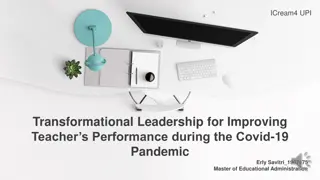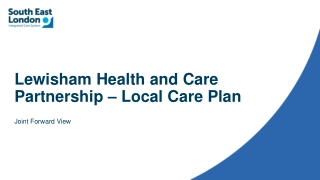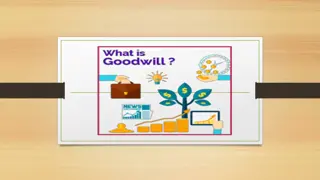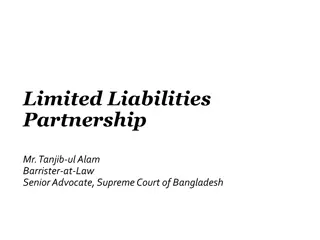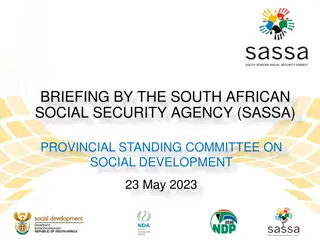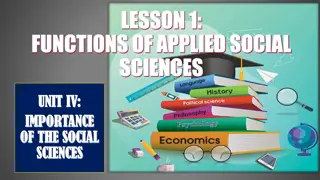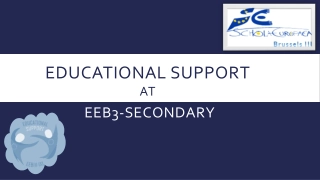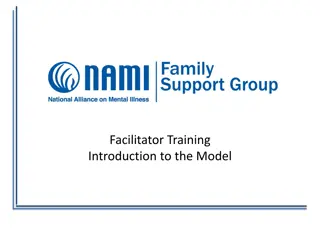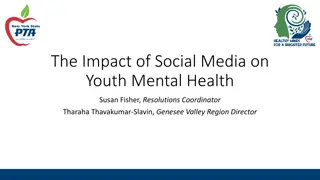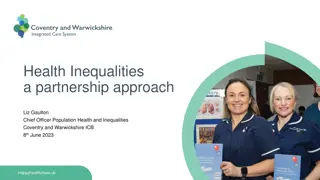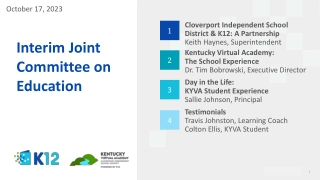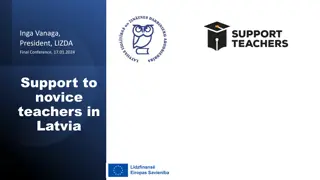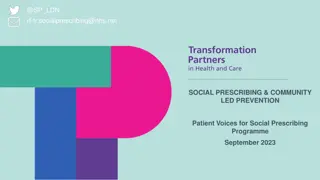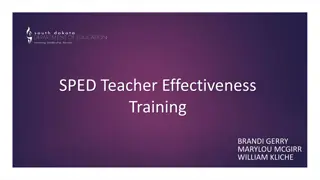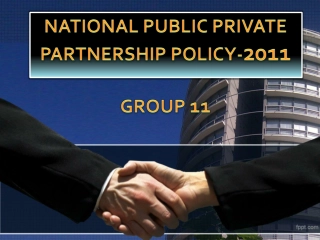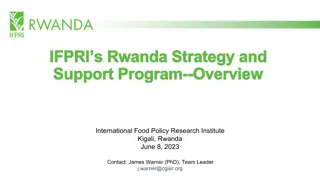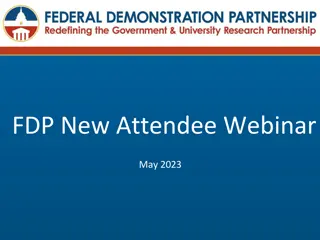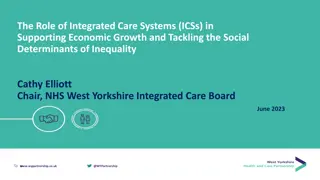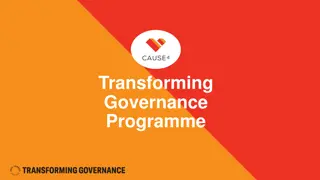Improving Teacher Support and Social Partnership in Lithuania
The project aims to address issues such as the lack of attractiveness and low prestige of the teaching profession, inadequate teacher salaries, and the need for a supportive environment in Lithuania. Through enhanced social dialogue and partnership at various levels, including national and workplace, efforts are being made to increase teacher salaries by 10% from January 2024 and reach 130% of the average national salary. Additional rights and guarantees for teachers, as outlined in the collective agreement, include paid study leave, health improvement days, and support for trade union activities. Aligning the pay system with the trade unions and addressing workload issues are part of the ongoing initiatives to enhance teacher welfare.
Improving Teacher Support and Social Partnership in Lithuania
PowerPoint presentation about 'Improving Teacher Support and Social Partnership in Lithuania'. This presentation describes the topic on The project aims to address issues such as the lack of attractiveness and low prestige of the teaching profession, inadequate teacher salaries, and the need for a supportive environment in Lithuania. Through enhanced social dialogue and partnership at various levels, including national and workplace, efforts are being made to increase teacher salaries by 10% from January 2024 and reach 130% of the average national salary. Additional rights and guarantees for teachers, as outlined in the collective agreement, include paid study leave, health improvement days, and support for trade union activities. Aligning the pay system with the trade unions and addressing workload issues are part of the ongoing initiatives to enhance teacher welfare.. Download this presentation absolutely free.
Presentation Transcript
Support Teachers in Lithuania. Ryga 17th January, 2024 LESTU project manager Inga Pui a
Problems in Lithuania: Problems in Lithuania: -lack of attractiveness and law prestige of the teacher s profession; -low relative salaries of teachers; -lack of well-supported environment.
Social dialogue in Lithuania Social partnership is supplemented: - by setting up and participating in bilateral and tripartite councils and concluding agreements on labour, social and economic matters; - by initiating the collective bargaining and conclusion of collective agreements; - In the context of information and consultation procedures - In conflict resolution: by initiating collective disputes over rights and collective disputes over interests
Social partnership in Lithuania may be conducted at the Social partnership in Lithuania may be conducted at the following levels: following levels: national;(1) sectoral;(1) territorial;(8) the workplace.(63)
+10 % from 2024 January + no less than 10 % from 2024 September Goal Teachers' salaries seek 130 % of the average salary in the country
In accordance with the collective agreement of the Lithuanian education sector the following additional rights and guarantees are provided for teachers: - Paid study leave (10 days full or 20 partly) - - - 5 paid days to improve health (with employer's notice) 3 additional days of annual leave 72 paid hours for trade union activities for members of governing bodies - - - 3 paid working days for TU members to attend TU events Up to 3 days for volunteering work Alignment of the pay system with the TU (pre-school and general education schools) Reduction of a TU member's workload only for objective reasons Remote working for TU members - - - Coordination with the TU on the period of aggregate working time accounting.
Collective agreements at employer level mostly cover: - working and rest time - the conclusion and performance of employment contracts - teleworking arrangements - setting the remuneration system - additional guarantees for trade union members - trade union rights to information and consultation - allocation of teachers' workloads and vacancies; - work during school holidays, etc.
Ministry of Education, Science and Sports has made initiatives to support novice teachers: - pay scholarships: 319/539 euros per month; - expand pedagogical studies. -"I choose to teach!" program.
Municipal initiatives: - finance the acquisition of a teacher's qualification or pedagogical bachelor's studies with their own funds; - compensate teachers' commuting expenses.
LESTU initiatives: In 2023 LESTU and a team from Mykolas Romeris University made research that reveals significant concerns regarding violence and bullying in the educational sector in Lithuania.
Research showed - Half of the educators reported social and verbal violence from students, while about a third experienced sexual violence from students and violence from parents. - Nearly a fifth of educators faced physical harm instigated by students, with about two- fifths experiencing instigations to disobey and insult the teacher. Additionally, nearly a tenth encountered offensive messages, photos, or videos, with more than a tenth suffering intentional property damage. - Verbal abuse and threats were the most common forms of violence from parents. - Specific groups of educators, such as pre-school teachers, subject teachers, and primary education teachers, experienced different forms of violence more frequently. - Urban educational institutions reported a higher frequency of all types of violence (except property damage from students) compared to other settings.
Research showed Inadequate Legal Regulation: The current legal framework in Lithuania is insufficient in protecting educators and educational staff from violence inflicted by students or their parents. The response to such incidents is often left to the personal emotional and financial capabilities of the educators. Culture of Bullying: More than half of the educators surveyed have witnessed instances where parents or guardians ridiculed teachers. There is also a significant presence of bullying among educators themselves and from administration towards teachers.
Recommendations from the project team Support for Novice Teachers by mentors Competitive Remuneration and Financial Support Professional Development and Training Legislation and Administrative Support Attracting Young Talent Class Size and Working Environment Safety in workplace Stakeholder Engagement
Recommendation on Competitive Remuneration and Financial Support 1. Establish a National Commission on Teacher Salaries 2. Legislate Minimum Wage Standards for Teachers 3. Ensure Equitable Funding Across Regions 4. Implement Tax Benefits for Teachers 5. National Campaigns to Elevate the Teaching Profession 6. Regular State-level Consultations with Trade Unions 7. Support Research on Teacher Workforce Dynamics: Fund research to understand the dynamics of the teacher workforce
Recommendations for supporting novice teachers by mentors 1. National Framework for Mentorship Programs 2. Mandatory Induction and Mentorship for Novice Teachers 3. Standardized Training for Mentors 4. Peer Support Networks 5. Diverse Supervisory Roles
Recommendations for Legislation and Administrative Support 1. Administrative Support for Addressing Teacher Shortages 2. Enhance Administrative Efficiency in Schools 3. National Strategies to Address Teacher Shortages 4. National Policies for Teacher Workload Management 5. Participatory Policy Development
Recommendations To attract young talent into the teaching profession. 1. Attractive Salary and Positive Profession Perception 2. Incentives and Career Advancement Links 3. Attractive Compensation Packages 4. Professional Development and Support
Recommendations for addressing Class Size and Working Environment issues. 1. Optimize Class Sizes 2. Assess and Adjust Workloads 3. Implement Stress-Reduction Programs 4. Teacher Training on Classroom Management 5. Community and Parental Engagement
Recommendations for engaging stakeholders 1. Foster Quality Social Dialogue with Trade Unions 2. Incorporate Trade Unions in Decision-Making 3. Transparency and Cooperation 4. Address Teacher Concerns and Needs 5. Regular Feedback and Review Mechanisms 6. Engage in Constructive Negotiations
Recommendations for Teachers' Safety and Psychological Well-Being: 1. Conduct Regular Microclimate Surveys 2. Evaluate Preventative Programs 3. Promote Interventions to Neutralize Bullying Culture 4. Publicize Cases of Violence 5. Improve Understanding of Children's Behavior 6. Develop Skills for Positive Organizational Culture 7. Adhere to a Zero-Tolerance Policy
THANK YOU! www.svietimoprofsajunga.lt facebook.com/svietimoprofsajunga instagram.com/lsmps_stipruskartu info@svietimoprofsajunga.lt +370 682 27745




